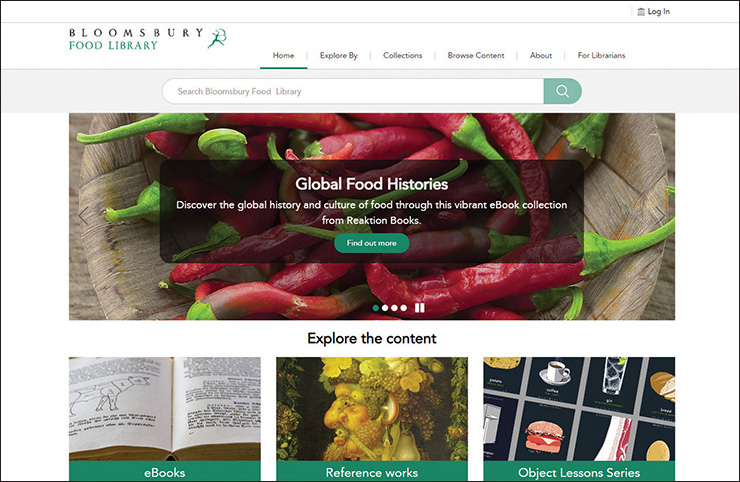Bloomsbury Food Library | eReview
Drawing from multiple disciplines, the Bloomsbury Food Library enables users to explore niche aspects of food history and their wider implications in historical and sociocultural contexts.
Bloomsbury Food Library
CONTENT Bloomsbury Food Library draws from multiple disciplines (history, sociocultural studies, agriculture, culinary arts, literature, political science, and more) to offer a rich collection of food studies materials. The resource features content across three main collections: the Core Collection, Global Food Histories, and Food Sustainability and Security.
The digital hub combines materials exclusive to Bloomsbury with content licensed from its partners, including the Culinary Arts Museum at Johnson & Wales University, the National Archives (UK), and the Metropolitan Museum of Art. Featured materials include Ken Albala’s Food Cultures of the World Encyclopedia, The Cambridge World History of Food, Bloomsbury’s six-volume Cultural History of Food, and additional materials to support curriculum development and research.
The new Global Food Histories collection adds an extra layer of resources to the Core Collection, with 123 ebooks (to date) on topics such as global cuisine, food history, and cultural food studies. Of these, 85 books are part of the “Edible Series,” which features illustrations, recipes, and reference material; four are from the “Food Controversies” series, focusing on food waste and consumption; and eight are part of the “Food Nations” series, which highlights countries such as India, Vietnam, Italy, and the United States. Future updates will include 15 new titles from Reaktion Books on global history, the philosophy of food, and cultural food studies.
USABILITY The home page offers a clean visual interface that encourages browsing and exploration. Users can explore the ebook collection, reference titles, the “Object Lessons” series, podcasts, images, research and learning tools, and collection highlights, including “Topic in Focus” and “Author in Focus” sections.
When searching, users can browse by title or search the entire library. Advanced-search tools allow for searching across multiple fields (location, title, author/editor/creator, summary/abstract, category/keywords, or identifier) and limiting results by content type (audio, bibliographic guide, book chapter, encyclopedia entry, lesson plan, museum, museum object, or ebook).
Each ebook features a handy table of contents and options for accessing specific pages. Each also has a summary that provides an overview and detailed publication information. Tools to save, print, share, and cite are also available. Ebook content can be read online and loads quickly in an HTML text-based format; page numbers and breaks appear as users hover over the text.
PRICING Bloomsbury Food Library Core Collection is available by subscription ($1,468–$7,325) or perpetual access ($8,812–$43,949). For a one-time purchase option, there is a mandatory content update fee of $600–$1,000, which begins one year after the initial purchase. Global Food Histories is available by subscription ($921) or perpetual access ($5,525). Food Sustainability and Security is available by subscription ($673–$2,688) or perpetual access ($4,033–$16,128). Pricing is based on institution size and type, and consortia discounts may apply.
VERDICT The Bloomsbury Food Library provides a fascinating look at the history of food, with broad interdisciplinary appeal. The Global Histories collection adds further value for subscribers, allowing users to explore niche aspects of food history and their wider implications in historical and sociocultural contexts. Banana art, anyone?
RELATED
ALREADY A SUBSCRIBER? LOG IN
We are currently offering this content for free. Sign up now to activate your personal profile, where you can save articles for future viewing










Add Comment :-
Comment Policy:
Comment should not be empty !!!